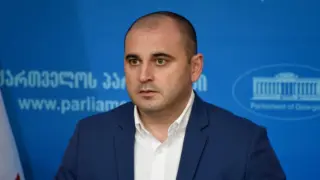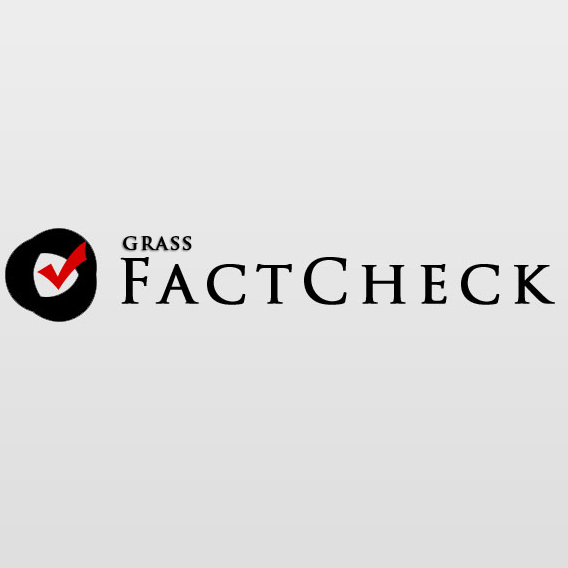Levan Khabeishvili: “The Rike Jugs, the Parliament in Kutaisi and the stadium in Zugdidi – these are examples of how Ivanishvili’s government is destroying state property.”
FactCheck concludes that Levan Khabeishvili’s statement is MOSTLY TRUE.
Levan Khabeishvili’s cited infrastructure projects cost a significant sum to the state. Specifically, the construction of the so-called Rike Jugs amounted to GEL 75 million, the former Parliament in Kutaisi cost GEL 320 million and the Zugdidi stadium totalled GEL 15 million. Despite the aforementioned, neither the Rike Jugs nor the Kutaisi Parliament retained their original functions. The former was sold for GEL 10 million – more precisely, the land on which the Rike Jugs stood – after the government permitted the demolition of the buildings.
Part of the Kutaisi Parliament building is set to be converted into a technology park. A total of GEL 21 million has been spent on renovations so far with additional costs for setting up the tech park still separate. Whether the former parliament building will acquire a functional role and be used efficiently remains unclear.
As for the Zugdidi stadium – despite GEL 10 million in spending, it did not meet UEFA standards. Deficiencies included malfunctioning safety systems, limited visibility from 370 seats and a concrete wall around the stadium posing health risks to players during collisions. Correcting these issues called for a second tender, initially valued at GEL 9.9 million but ultimately reduced to GEL 4.4 million. This reduction was due to the western stand remaining open, as closing it would have caused structural cracks and required additional safety design, which the contractor refused. Ultimately, the Municipal Development Fund received the stadium as a completed quality project.
Government errors were evident in all three cases. Whilst two of the three projects were built under the National Movement government, the Georgian Dream administration had 12 years to find ways to use the buildings effectively. Considering the above, FactCheck concludes that Levan Khabeishvili’s statement is mostly true.
Analysis
Speaking about the destruction of state property under the Georgian Dream government, Chairman of the Political Council of the National Movement, Levan Khabeishvili, cited the Rike Jugs, the Parliament in Kutaisi and the stadium in Zugdidi as examples.
“Unfortunately, state property is often deliberately destroyed or pushed into private hands. Take the Rike Jugs, for instance – they started the auction at GEL 95 million and sold it for ten times less. Despite specific conditions being set, they were violated and now the plan to demolish it entirely. The same happened with the Kutaisi Parliament and surrounding buildings which were highly significant state assets. Now you can go there and see grass growing inside… As for the Zugdidi stadium, it is a clear example of tens of millions being spent for something completely non-functional. You cannot even watch a football match there properly because it was built incorrectly. Go to Zugdidi and see it for yourself – the stadium is a prime example of a Georgian Dream construction, ruined despite around GEL 20 million being spent,” – Khabeishvili said.
FactCheck has verified this statement.
Rike Jugs
One of the most expensive unfinished buildings in Tbilisi, which has lost its original function, is the so-called Rike Jugs. The Rike Jugs consist of two tube-shaped structures intended to house a musical theatre and an exhibition centre. The project was designed by an Italian architect Massimiliano Fuksas. The Rike Jugs ranked amongst the world’s top ten cultural centres in 2016, placing 10th on Designboom.com’s list of leading cultural venues.
The Rike Jugs were meant to host a musical theatre and an exhibition centre as known at the initiation of the project. Despite GEL 75 million being spent on the project between 2011 and 2012, the buildings remain non-functional to this day.
The Mayor of Tbilisi informed journalists in February 2019 that several investors had shown interest in the Rike Jugs. Subsequently, by early 2020, Kakhi Kaladze stated that no investor was willing to take the building, even for a symbolic price of one GEL, as at least GEL 20 million would be needed to complete it.
The Rike Jugs were on the Ministry of Economy’s balance sheet. The first auction was announced on 31 January 2020 with a starting price of GEL 95 million; however, it ended unsuccessfully and the Rike Jugs remained unsold.
The next auction was announced in March 2021, with a starting price of GEL 71,250,000, but it also ended unsuccessfully. The government put the Rike Jugs up for a third auction in early April, again setting the starting price at GEL 71.2 million. A subsequent auction on 29 April 2021 set the starting price much lower at GEL 47.5 million with the bid increment determined at GEL 20,000.
The Rike Jugs have not been state property since 2022. They were sold on the sixth attempt for GEL 10,020,000 – ten times less than the initial price – to a company owned by businessman David Khidasheli who is close to the Georgian Dream. The company was to develop a wine, digital art and technology museum and conference spaces on a 14,591 sq. m. plot within 36 months.
Khidasheli’s company, Global Victory Trust, sold the Rike Jugs for GEL 10 million. The building’s new owner became LLC Rike Dom. The government granted permission to demolish the Rike Jugs and build a hotel on the site.
The Rike Jugs were sold again just one months later – this time to LLC Maqro Property. The new private investor has not yet presented a project, leaving questions about how the land in the Rike Park will be developed, the number of hotel floors, the investment volume and the brand under which it will operate.
Thus, the building that cost the state GEL 75 million to construct was ultimately sold for GEL 10 million and was subjected to demolition by government decision.
Kutaisi Parliament
The Parliament building in Kutaisi lost its original function after a legislative change in December 2018 designated the Rustaveli building in Tbilisi as the official seat of Parliament. It was announced shortly afterward that a West Georgia police hub would be housed in the Kutaisi building. This plan was cancelled later and the building was transferred to the Ministry of Economy. Notably, the construction of the parliament building cost around GEL 320 million.
The Ministry of Economy announced plans to establish a technology hub in the Kutaisi Parliament building at the end of 2024. The hub will integrate several components, including an interactive science and technology museum, a start-up accelerator, an international IT school, conference facilities, co-working spaces, a high-capacity data centre for developing Georgian artificial intelligence and experimental laboratories for electronics, robotics, drones, IoT, STEAM, industrial innovations (fablab) and other fields, according to the Ministry.
A total of GEL 12 million from the budget will be allocated to set up the technology hub, with GEL 3 million designated for 2024 and GEL 9 million for 2025 by the Ministry of Economy and Sustainable Development, under a government decree.
Rehabilitation work on the Kutaisi Parliament building is being carried out by the company Casa Calda (Tbili Sakhli), with the contract, valued at GEL 21 million, covering the renovation of the building’s electrical system, heating, cooling and air-conditioning and other internal utilities.
The Innovation and Technology Agency has been tasked with setting up the technology hub. The agency launched a tender (NAT250006937) for preparing cost documentation and carrying out construction work (Design-Build method) for the pool, roof hydro-insulation and dome thermal insulation of the hub (former Parliament’s C Block). LLC Hydroservice won the tender with the contract valued at GEL 5.3 million.
In addition, the Innovation and Technology Agency has announced other tenders for the technology hub, including: furniture procurement (NAT250013456) valued at GEL 1,230,509, hardware AI kits and related inventory for the Kutaisi Technopark worth GEL 40,000 and robotic devices for the Kutaisi Technopark – including a humanoid robot, robot dog and robotic arm – valued at GEL 711,800 (NAT250013116), amongst others.
It is also notable that the agency announced a simplified procurement at the end of 2024 (SMP240002594), signing a EUR 1.8 million contract with an Armenian company TUMO. The agreement covers a five-year partnership and the establishment of a training centre in the former Parliament building.
Infrastructure Minister Revaz Sokhadze visited the former Parliament building together with representatives of local and central authorities in June of this year. Whilst reports indicate that the meeting discussed ways to develop the site effectively and potential projects, no specifics were provided, nor was the opening of the technology park planned for 2025 mentioned. As noted above, approximately GEL 320 million was spent on constructing the Kutaisi Parliament building. An additional GEL 21 million has already been spent on its subsequent rehabilitation, not including costs for establishing the technology park.
Whether the former Parliament building will acquire a functional role and be used effectively remains to be seen. We will monitor this issue and provide readers with updated information.
Zugdidi Stadium
Construction of the Zugdidi Central Stadium began in 2015. The municipality announced a tender worth GEL 9.9 million (SPA150028614), with LLC Dag winning out of the two participating companies. Whilst LLC Dag was required to complete the work by 30 September 2017, the stadium was actually finished in December 2017. However, it did not meet UEFA standards and the Football Federation refused to accept it. Deficiencies included malfunctioning safety systems, limited visibility from 370 seats and a concrete wall around the stadium posing health risks to players during collisions.
Afterward, work on the Zugdidi Central Stadium was halted for about a year. A new tender (NAT190016982) was announced in September 2019, this time by the Municipal Development Fund instead of the Zugdidi Municipality. The state procurement called for the completion and rehabilitation of the central stadium as well as the construction of a new artificial turf training stadium.
Two companies participated in the tender, with LLC Maqro Construction emerging as the winner. Despite the initial contract price being set at GEL 9.9 million, the final amount was reduced to GEL 4.4 million. This reduction resulted from halting the roofing of the main stadium’s western stand as the structure developed cracks. A structural reinforcement project for the frame was required – according to the National Bureau of Forensic Expertise – which the contractor refused to carry out. Additionally, the cost of one lighting mast for the training stadium was removed from the budget.
The Municipal Development Fund took over the stadium in December 2024 with the final acceptance act stating that the work was completed in accordance with the quality requirements of the existing project.







